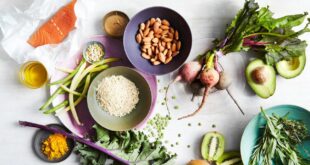Protein is a key macronutrient that, until very recently, tended to get kicked down the road in our daily schedule or priority list. Just get it later at dinner! Don’t worry about it now!
But the truth is, when you simply start focusing on eating more protein, at every meal and throughout the day, good (healthy) things tend to follow.
Those are just a few of the reasons why Women’s Health is going *all in* on protein. We want to help you amp up the MVP macronutrient in your life. So, we’re challenging you to think about protein more intentionally and strategically, and make it a goal to try a new idea, recipe, hack, etc, every single day for the next two weeks (and beyond!).
So protein should be an all-day priority. Please explain…
If you’re like most Americans, you probably do get the bulk of your protein at dinner right now. Women between the ages of 20 and 49 were found, on average, to consume about 42 percent of their daily protein at dinner and just 17 percent at breakfast, per a survey conducted by the U.S. Department of Agriculture’s (USDA) Agriculture Research Service.
What we *should* aim for instead, say experts, is a distribution of protein throughout the day. Why? It all comes down to how your body metabolizes protein and its building block, amino acids.
Surplus carbohydrates are stored in the body as glycogen and surplus fat is stored as as body fat, but amino acids aren’t squirreled away to be used later. Rather, after our body uses what it can of the protein we eat at a meal—by supporting metabolism, producing hormones, maintaining bones and, yes, aiding muscle protein synthesis—it is then converted into either fat or glucose.
This means that we need to constantly fuel it with protein at each eating opportunity, otherwise it doesn’t have much to work with (or synthesize).
Psst: You probably need to eat more protein than you think.
While the Recommended Daily Allowance, aka the RDA, has long held at 0.8 grams per kilogram of body weight (or .36 grams per pound), experts stress that women and those who are active likely need *much* more than that. “That is just a baseline,” says Kristen Smith, RD, a national spokesperson for the Academy of Nutrition and Dietetics. “It’s the minimum amount you need to eat daily to stay healthy but doesn’t take into account specific goals or medical conditions,” she says.
Protein is so freakin’ awesome because… “Besides muscle strength, performance, and aesthetics, protein plays a huge role in our overall metabolic balance,” says WH advisor Lauren Kanski, CPT, kettlebell expert and senior founding fitness and nutrition coach for the Ladder app. “It is also the most satiating macro, and consuming adequate protein and improving muscle health decreases blood pressure, lowers blood sugar, decreases triglycerides, increases HDL, strengthens immune function, the list goes on…” Quite the case for protein!
For instance, if you’re someone who exercises multiple times a week and is looking to gain muscle, you may want to aim for 1.2 g/kg or slightly above, says Kelly Jones, RD, a board-certified sports dietitian and founder of Kelly Jones Nutrition. (A sports nutritionist, a registered dietitian, or specialized nutrition coach can help you figure out the optimal levels for your lifestyle and goals.) Some experts say that just aiming for 25-30 g of protein at each meal is an easier way to go about boosting your intake. Whatever works.
 OMNA Health, Fitness, Fashion, Beauty, Style, Tech & Travel
OMNA Health, Fitness, Fashion, Beauty, Style, Tech & Travel



